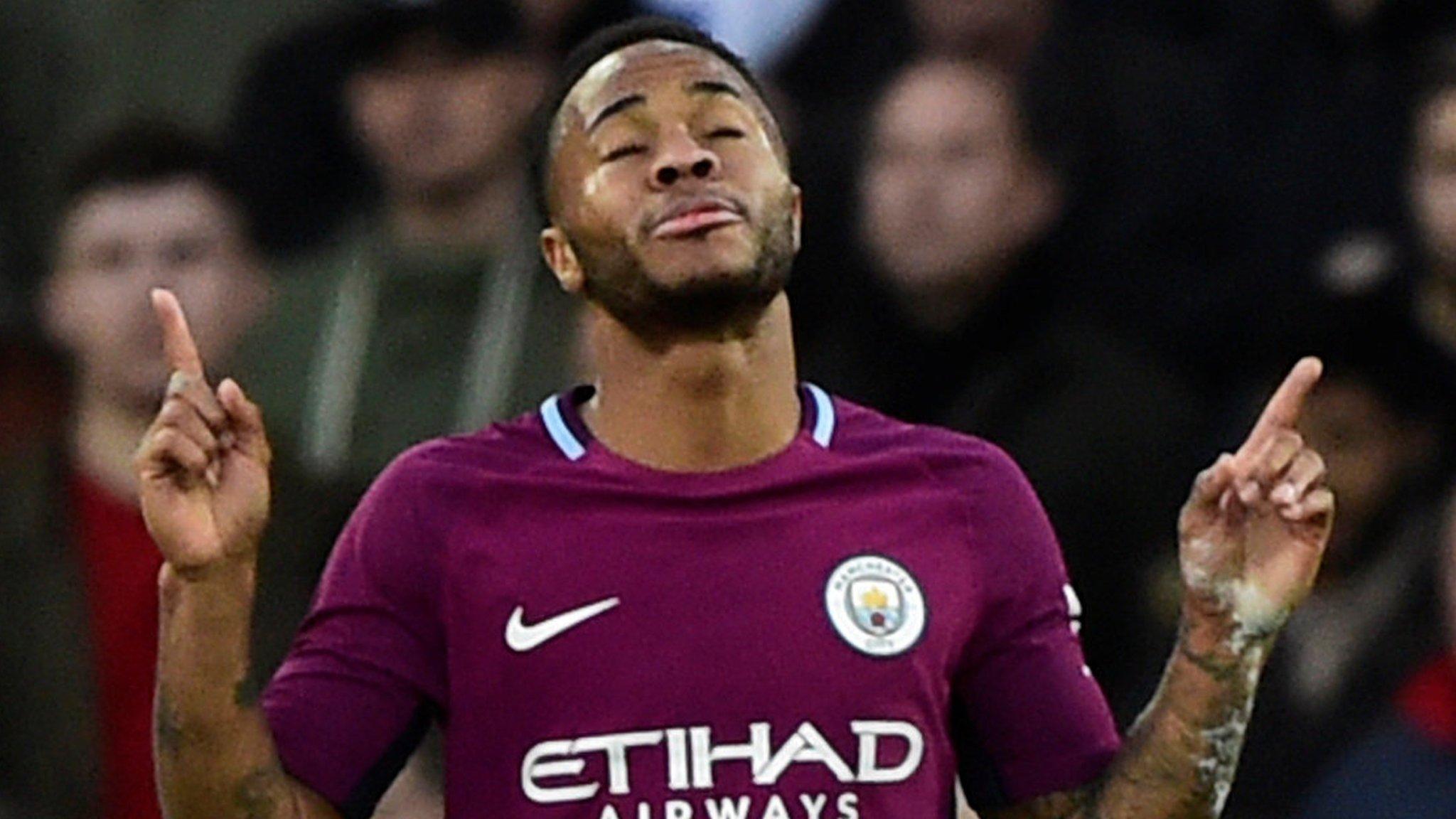FA Cup: The inside story of Wigan’s win over Manchester City in the 2013 final
- Published
- comments
When Manchester City's players went downstairs on 11 May 2013 - the morning of the FA Cup final - the televisions in their hotel were showing wall-to-wall coverage of reports that their manager Roberto Mancini was about to be sacked.
As far as last-minute preparations for Wembley go, it was not exactly ideal.
In contrast, the Wigan squad had woken up to find inspirational messages from their team-mates that had been pushed under the doors of their rooms.
It was one of a number of psychological "masterstrokes" by Latics boss Roberto Martinez that, combined with innovative tactics, helped a team battling relegation bamboozle their superstar opponents at Wembley and secure a famous last-gasp victory through Ben Watson's brilliant header, just six months after he had broken his leg.
FA Cup: Boyce relives Wigan's 'fairytale' FA Cup win
There was not much of a party at the end of it for anyone, though.
Wigan celebrated with Lucozade because alcohol was banned on the coach home and just three days later they were relegated from the Premier League - hours after Mancini did indeed lose his job.
This is the story of that incredible week seven years ago, told by the players who were part of one of the greatest FA Cup final shocks in the competition's 148-year history, as well as the coaches and staff who helped to mastermind it.
The big day: Martinez's managerial masterstroke
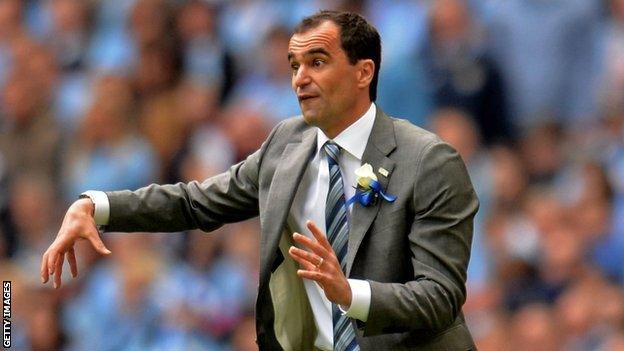
Former Wigan boss Robert Martinez brought in a psychologist in the build-up to the final
Big-spending City, who had won the FA Cup in 2011 and the Premier League in 2012, were second in the table on the day of the 2013 final. Wigan, who had never won a major trophy in their 81-year history and had only been in the Football League since 1978, were 18th. These facts combined to make Mancini's side massive favourites to collect another trophy.
Joleon Lescott, Manchester City defender: "It was a little bit weird on the morning of the final. We were eating breakfast together and the TVs were on with Sky Sports News reporting that Mancini was going to get sacked.
"In a scenario like that, you would normally hear about five or six potential new managers and it could be any of them so you think it is just speculation, but this time Manuel Pellegrini was the only name being mentioned.
"It seemed such a left-field situation to us players and it was so well documented that we were left thinking that it must be true."
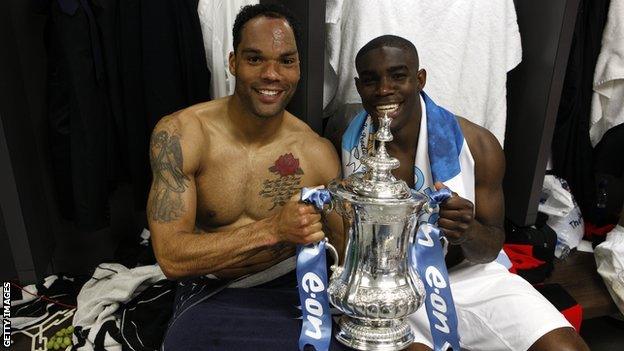
Lescott did not make it off the City bench in the 2013 final but played in two other FA Cup finals - losing with Everton in 2009 and winning with City in 2011
Gary Caldwell, Wigan's club captain: "We had been seeing a psychologist in the build-up to the final, and the day before the game we did an exercise where the players and staff had to write down why we were proud to be walking out at Wembley with each other. We handed it back and did not know what it was going to be used for.
"That night or the next morning, everyone found an envelope under their door. We opened it to find everything that our team-mates and the staff had written about us, on strips of paper.
"It was quite emotional and very powerful. You really felt a sense of the team spirit and that was a fantastic thing to do right before the final."
Graham Barrow, Wigan's first-team coach: "Nobody signed any of it, so you did not know who had written what, but you obviously had some idea. It made everyone feel 10ft tall.
"It was a masterstroke by Roberto - it was brilliant timing to bring in the psychologist when he did. More than anything, he got the players thinking, and it probably brought them together at exactly the right time."
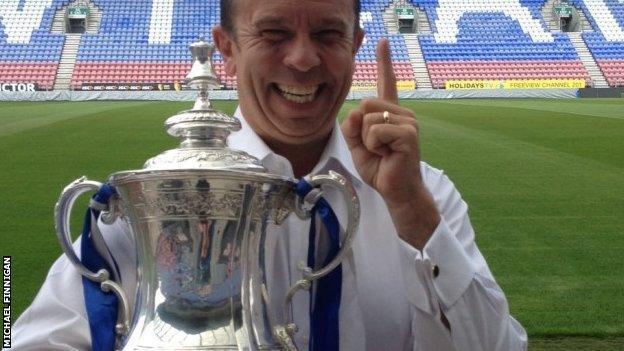
Who is Michael Finnigan? He had helped golfer Darren Clarke win The Open in 2011 and was working with Everton boss David Moyes when Wigan beat them 3-0 in the FA Cup quarter-finals. "I had lunch with Roberto before Wigan's semi-final with Millwall and he said "I love what you do, can you come and work with us for the rest of our cup run?" Finnigan recalled. "I didn't see them again after the final - it was only for those two games."
Michael Finnigan, the performance psychologist who worked with Wigan before their semi-final and final: "Everyone was involved, including the kit men and the physios, so each of the Wigan players read around 30 statements that morning about what everyone thought of them.
"The aim of that was for each player to read them and think 'I am going to win the cup for all of you'.
"I'd used it before, when I'd worked with Bolton, before the Championship play-off final in 2001 when they beat Preston. Bolton won that game 3-0 and I knew that for a long time Sam Allardyce, who was Wanderers boss then, still carried his envelope with his messages in it around with him. Gudni Bergsson, their centre-half, used to keep his in his boot bag."
The final team talk: "You dreamed of this as a kid. Close your eyes, and imagine it"
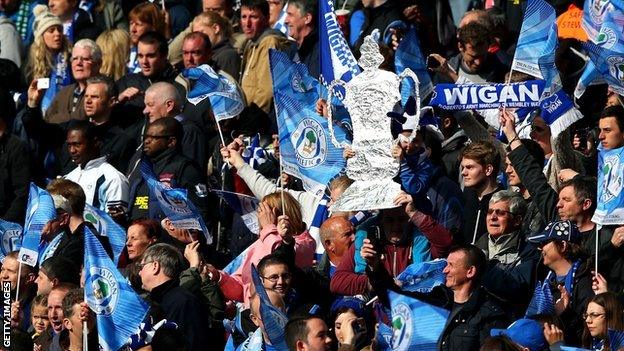
Wigan has a population of 81,000 and there were 31,000 Latics fans at Wembley for the final
Seven of City's starting XI had featured in their 2011 FA Cup final win. None of Wigan's players had played in an FA Cup final before.
Wigan skipper Emmerson Boyce: "'Believe' was the big theme right through that cup run. One of the last things Roberto talked to us about before the game was about how we had dreamed we would be playing at Wembley in a game like this when we were growing up.
"He told us to close our eyes and imagine it. I was thinking about how I would pretend I had won the FA Cup when I was just a kid playing in the park.
"Roberto also said that we had family here watching us and this was a one-off opportunity to go and make history and leave a legacy for ourselves as well as Wigan as a football club.
"There was also a big onus on David and Goliath. We were the underdogs and no-one was expecting anything from us, so we had nothing to lose.
"That was Roberto's man-management style all over. He was fantastic - he took all the pressure off us and made sure everyone was relaxed and calm. He just wanted us to play without fear.
"Then, before we went into the tunnel, he asked us all if we thought we deserved the trophy. I think the way we played showed that we all did."
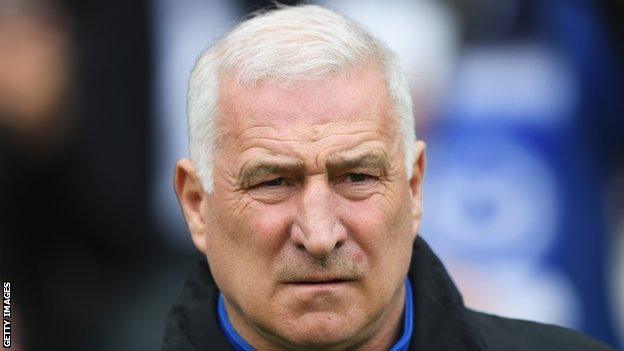
Barrow, who was Wigan's manager when they signed Martinez as a player in 1995, had spent his entire playing and managerial career in non-league and the lower leagues before joining Martinez as Wigan's first-team coach in 2009
Graham Barrow: "Playing the semi-final at Wembley definitely helped us. We had come down early before that match and walked around because the stadium was new to us. We got rid of that before the final and we could concentrate on the game."
Emmerson Boyce: "The Wigan chairman Dave Whelan led us out on to the pitch and he spoke to us right before the game. Obviously we all knew about his broken leg in the 1960 final - people would always joke to us in the build-up that he was telling that story again.
"But this time he just said that was the memory he had of Wembley so we had to go out there and create a memory for ourselves that will be absolutely fantastic, and leave here with no regrets.
"Then he shook everyone's hand before we went out. It was probably his proudest moment to walk back out on that pitch and to lead his team, his club, out at Wembley for an FA Cup final after what had happened to him there 53 years earlier."
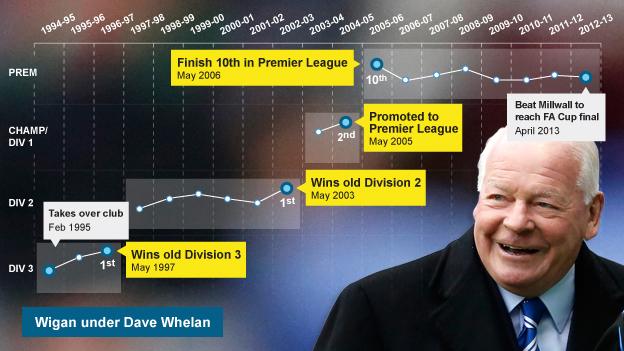
Dave Whelan, who took Wigan from division three to FA Cup winners in his time as chairman, gave the players a speech just before the game
Emmerson Boyce: "I walked out with Joseph Kendrick, who was our lucky mascot for the final, in my arms. To be honest, he calmed me down because there was just a wall of noise.
"The club had a long connection with Joseph, who has a genetic disorder that affects his immune system, and his charity 'Joseph's Goal', so we all knew him and his parents very well. I also related to his situation personally because a couple of years earlier my son Jayden had gone into hospital and had been on a ventilator, and I'd had a peek into what his parents go through every single day.
"I was meant to push him out in his wheelchair but I just wanted to pick Joseph up and take him with us.
"He was not just our mascot, he was one of us and the courage he had shown epitomised our togetherness and belief as a team. That was what that cup run was all about - that it doesn't matter if the odds are against you."
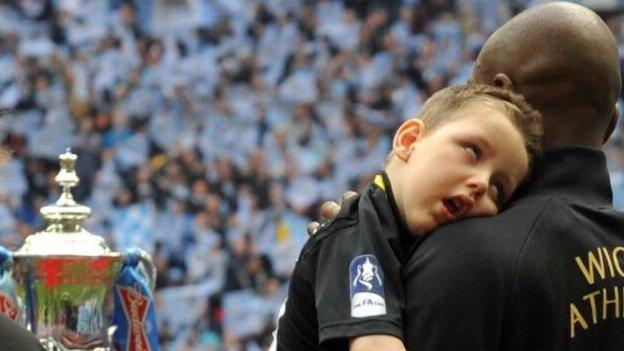
Joseph, who was four at the time of the 2013 FA Cup final, suffers from the rare genetic disorder nonketotic hyperglycinemia. The charity 'Joseph's Goal' was set up in 2012 to fund research into the condition
The tactics: "No-one had done what Wigan did against us before"
Joleon Lescott: "Although the build-up was unusual with the Mancini stories, there was no way it affected our preparation for the game. It was always about winning at City, and we wanted another trophy.
"But that season, Wigan had already pushed us very close. A few weeks before the final we beat them 1-0 at Etihad Stadium but they had a strange formation, where their wingers did not drop back and defend."

Wigan started the FA Cup final with the same formation that had troubled Manchester City in the Premier League
Gary Caldwell: "That was the night we all knew we could win the cup because we played so well. We used the same tactics in the FA Cup final, with three at the back and wing-backs in a kind of 3-4-1-2 formation."
Joleon Lescott: "It just threw us. We were winning most games because we were better than anyone else, and tactically we were good enough to hold out and defend - but no-one had done what Wigan were doing."
Gary Caldwell: "We always tried to keep the ball and attack - Martinez wanted us to play football, but we also had to respect how good City were, so our wing-backs dropped into a five at the back when they had possession.
"That meant our centre-backs could stay narrow and there were no gaps between them, which was important because we knew Carlos Tevez would try to feed on little balls between them from David Silva.
"Up the pitch, Shaun Maloney had a huge role in making the system work. He was dropping back in defensive situations to block the middle of the pitch but he also gave us an attacking outlet. He made a massive effort physically and also provided some quality going forward.
"Then, with the strikers, we split them instead of playing two down the middle. When City attacked us with their full-backs, we had a counter-attack threat in both channels - Callum McManaman with his pace and trickery down the right and Arouna Kone with his pace and power down the left."
Graham Barrow: "It pretty much all went to plan. City started the game really well and Carlos Tevez had a great chance early on that Joel Robles saved with his feet, but that calmed us down and it was almost like scoring a goal because it gave everyone such a lift. We grew into the game from there."
Back from a broken leg: The story behind Watson's winner
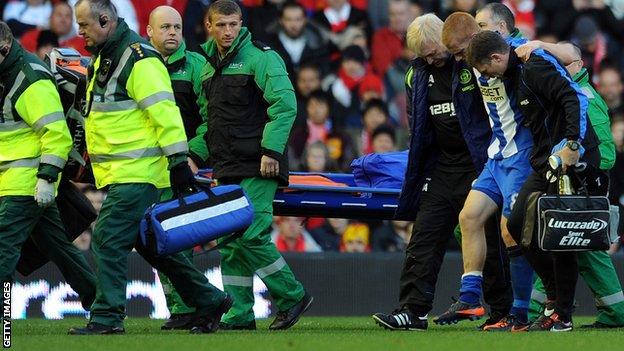
Wigan's Ben Watson broke his leg in a 3-0 defeat by Liverpool
Watson had broken his leg in November 2012 and did not return to action until the start of May. He came off the bench with nine minutes remaining, and three minutes later City were reduced to 10 men when Pablo Zabaleta was sent off. In the 91st minute, Watson rose to meet Shaun Maloney's corner at the near post and planted his header into the back of the net to win the FA Cup.
Gary Caldwell: "I remember Ben was getting ready to go on and [goalkeeper] Mike Pollit told him 'go on, you can make yourself a hero here'.
"It was a brilliant header but it was a fantastic leap too and there was a story behind it because of all the work he had done on improving his standing jump when he was recovering from his injury. That kind of goes unnoticed."
Gaz Piper, Wigan's strength and conditioning coach: "If you watch the goal in slow-motion, Ben took off on the leg he had broken.
"When I started working with him, he couldn't even walk. He had spent so long working on his jumping and landing, single leg and double leg, so it was fitting that he got his reward for working so hard on those tiny things that a lot of players take for granted.
"When I watch the goal back now it is even more emotional. He is such an incredible character. I don't think other players would have made it back from that injury in time for the final but Ben's enthusiasm and positivity were what carried him over the line.
"We grew an incredible friendship over his six or seven months of rehab when we spent every day together, living in each other's pockets, so it meant even more.
"After the game we just had a moment together and had a bit of a hug. He kind of said "that was for you" - it sounds a bit cheesy but it wasn't like that. We both knew what he had been through and I had been a big part of that."
The celebration: Lucozade, card games and a coach journey
Latics ecstatic: Wigan fans celebrate Cup win
Speaking about Wigan's FA Cup win in 2015, Martinez said: "Graham Barrow is someone who is always calm and in control and I can remember him running towards the middle of the pitch at Wembley and then coming towards me. He had a tear in his eye and he said 'we just won the FA Cup' in a way he could not believe it."
Graham Barrow: "My wife and daughter were in the posh seats behind the dug-outs but my son had gone with some friends and he was on the opposite side of the pitch. I could see him and that was who I was running towards. To be part of an FA Cup-winning team was very special for me - it was a day that was everything I dreamed it would be, and more."
Gary Caldwell: "I had not played a minute of our cup run. I had some problems with my hip and I was taking injections just to train - I had played against Swansea on the Tuesday before the final and had two injections just to play.
"I could barely walk until the Friday and the manager knew how unfit I was but I was very close to Roberto and I said 'if you need me, I am here' because I was going to do anything I could to contribute.
"I think any club captain would say that when you don't play in a game, you feel a bit awkward at the time it comes to get the trophy but Graeme Jones [Wigan's assistant manager] came up to me after the game and said you have been a massive part of this club, go up with Emmerson and lift it together."
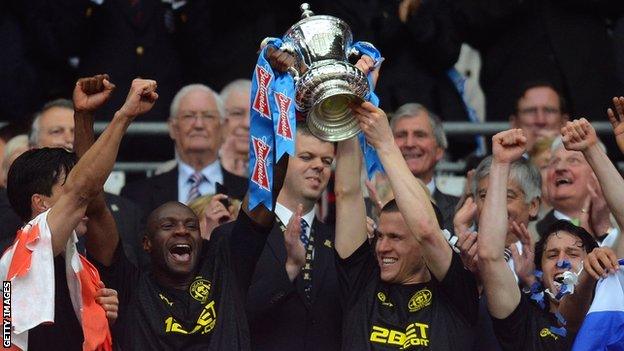
Gary Caldwell was an unused substitute as Wigan beat Manchester City at Wembley - Emmerson Boyce led the side on the day
Emmerson Boyce: "When the final whistle went, there was a sense of disbelief. We were thinking 'what do we do now?'
"I remember telling Dave Whelan when we went up to collect the trophy that he had a new story to tell now. I said: 'you haven't got to wait any longer, you have finally got your cup'.
"I had to go and take a drugs test after the game and pretty soon after that we had to leave Wembley. There was no alcohol on the coach home because we had a big game against Arsenal on the Tuesday. We had Lucozade instead of champagne because we were preparing for that.
"It was a three-and-a-half hour journey and when we got back to Wigan it was a case of going home and resting up. It wasn't how we thought our celebrations would go, let's put it that way."
Gary Caldwell: "Looking back, it would have been good if we could have stayed down in London and had a little party with our families because we didn't really see them much after the game.
"We spoke to them on the phone when we were travelling back and their coach was rocking - it was a bit rowdy compared to ours. We were just playing cards, supping juices, but we had the FA Cup sitting next to us. It was a bit surreal."
The relegation: A parade, and City sack their manager
Manchester City announced manager Roberto Mancini had been sacked with a statement on their website at 10:22pm on Monday, 13 May. Wigan were relegated on the Tuesday evening after losing 4-1 at Emirates Stadium. Their final game of the season was a 2-2 draw with Aston Villa on Sunday 19 May and they had an open-top parade through Wigan the following day.
The Latics gave Everton permission to speak to Martinez on 28 May and he was appointed Toffees boss on 5 June. Manuel Pellegrini was named City manager on 14 June.
Graham Barrow: "The killer was the day after the final. We reported into training for a recovery session and every result had gone against us. The four teams immediately above us all picked up at least a point. It really did end any hope we had.
Premier League table on FA Cup final morning:
Position | Team | Games Played | Points |
|---|---|---|---|
15 | Sunderland | 36 | 38 |
16 | Norwich City | 36 | 38 |
17 | Newcastle United | 36 | 38 |
18 | Wigan Athletic | 36 | 35 |
19 | Reading | 36 | 28 |
20 | Queens Park Rangers | 36 | 25 |
Premier League table the day after Wigan's FA Cup win:
Position | Team | Games Played | Points |
|---|---|---|---|
15 | Fulham | 37 | 40 |
16 | Aston Villa | 37 | 40 |
17 | Sunderland | 37 | 39 |
18 | Wigan Athletic | 36 | 35 |
19 | Reading | 36 | 28 |
20 | Queens Park Rangers | 37 | 25 |
Gary Caldwell: "We knew we had to win our last two games to stay up, starting at Arsenal. We went in and trained on the Sunday and all the players were tired or carrying injuries and trying to play through them.
"With such a small squad, ultimately it caught up with us in the end and our cup run cost us our Premier League status. I hear people saying all the time 'would you swap it' but I don't think you would - you are in football to win things, and we won the FA Cup."
Emmerson Boyce: "It was a very strange week with a huge low so soon after winning at Wembley. We didn't really know how to act at the parade because we had just gone down but the thousands of people who came out showed it was all right for us to celebrate."
Roberto Martinez leads Wigan FA Cup celebrations
Graham Barrow: "Probably the best thing about the way that season finished is that we had the parade to end things on a high.
"I know Wigan very well and we were coming up round the hospital and we had only seen about three people. I was looking at our goalkeeping coach Inaki Bergara and going 'this is it?' Then we got nearer the town centre and turned a corner and the reception we got was just mind-blowing.
"I think if you asked most Wigan people if they could choose between staying up and winning the FA Cup, they would take the cup any day. We won it and nobody can ever take that away from us."
A version of this article was first published on 18 February 2018
- Published20 February 2018
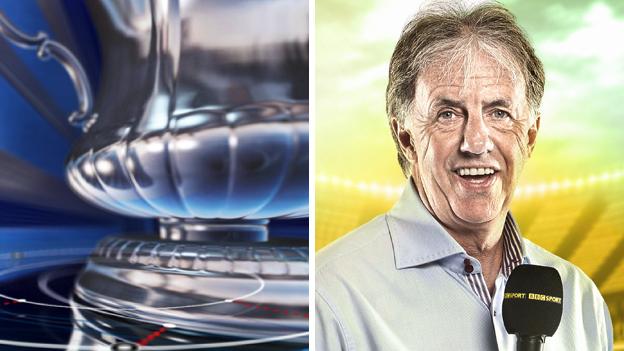
- Published19 February 2018
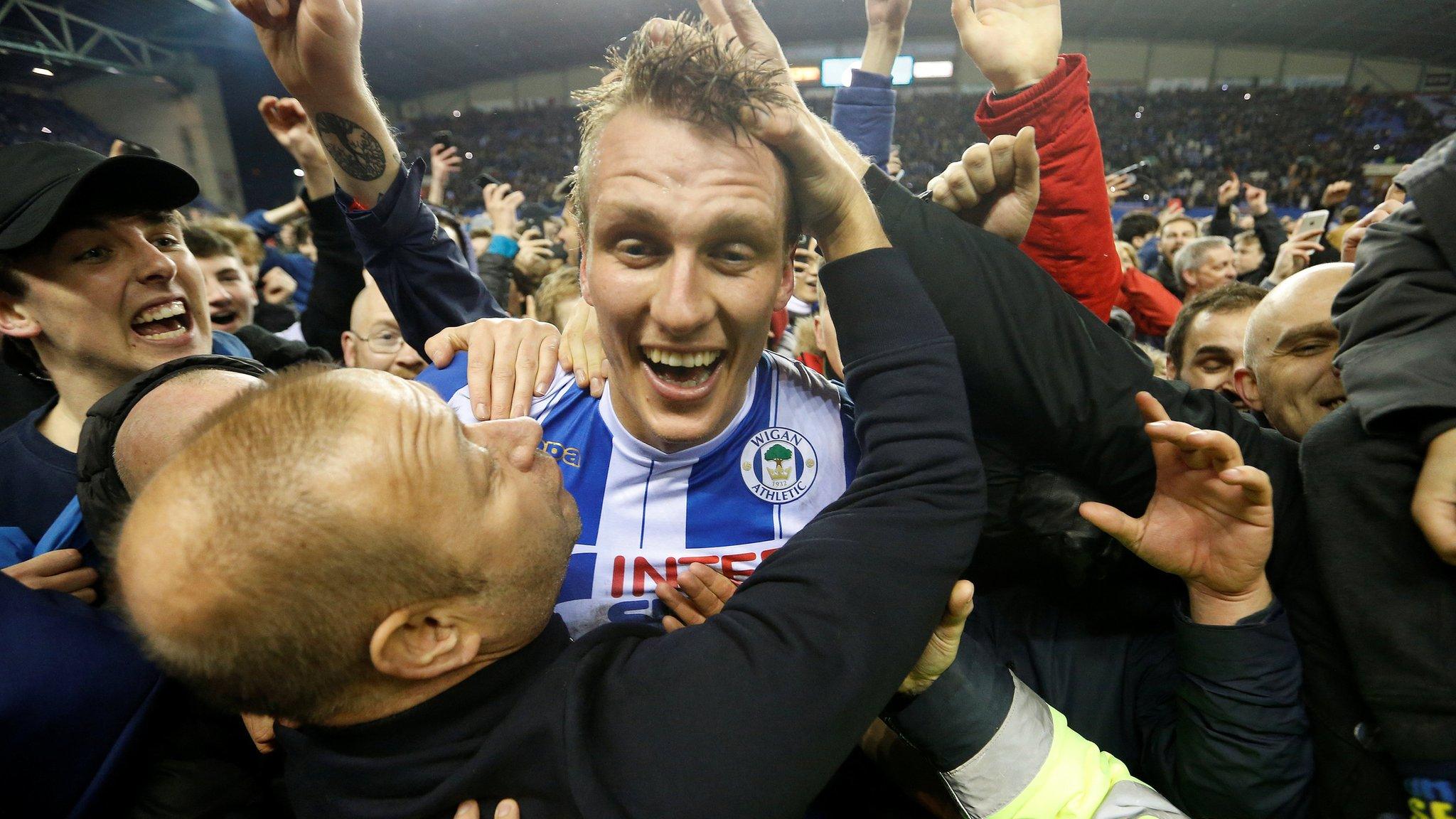
- Published16 February 2018
